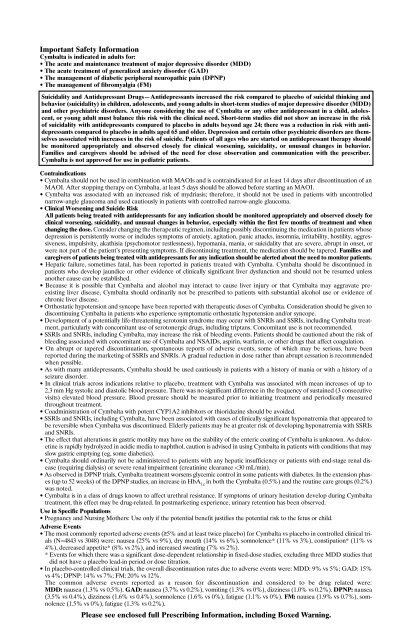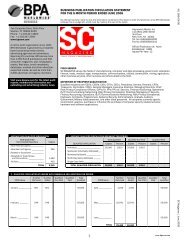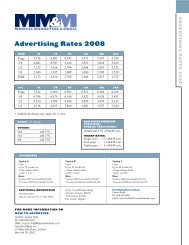Lunesta Letter - Haymarket Media Group
Lunesta Letter - Haymarket Media Group
Lunesta Letter - Haymarket Media Group
Create successful ePaper yourself
Turn your PDF publications into a flip-book with our unique Google optimized e-Paper software.
Important Safety Information<br />
Cymbalta is indicated in adults for:<br />
• The acute and maintenance treatment of major depressive disorder (MDD)<br />
• The acute treatment of generalized anxiety disorder (GAD)<br />
• The management of diabetic peripheral neuropathic pain (DPNP)<br />
• The management of fibromyalgia (FM)<br />
Suicidality and Antidepressant Drugs—Antidepressants increased the risk compared to placebo of suicidal thinking and<br />
behavior (suicidality) in children, adolescents, and young adults in short-term studies of major depressive disorder (MDD)<br />
and other psychiatric disorders. Anyone considering the use of Cymbalta or any other antidepressant in a child, adolescent,<br />
or young adult must balance this risk with the clinical need. Short-term studies did not show an increase in the risk<br />
of suicidality with antidepressants compared to placebo in adults beyond age 24; there was a reduction in risk with antidepressants<br />
compared to placebo in adults aged 65 and older. Depression and certain other psychiatric disorders are themselves<br />
associated with increases in the risk of suicide. Patients of all ages who are started on antidepressant therapy should<br />
be monitored appropriately and observed closely for clinical worsening, suicidality, or unusual changes in behavior.<br />
Families and caregivers should be advised of the need for close observation and communication with the prescriber.<br />
Cymbalta is not approved for use in pediatric patients.<br />
Contraindications<br />
• Cymbalta should not be used in combination with MAOIs and is contraindicated for at least 14 days after discontinuation of an<br />
MAOI. After stopping therapy on Cymbalta, at least 5 days should be allowed before starting an MAOI.<br />
• Cymbalta was associated with an increased risk of mydriasis; therefore, it should not be used in patients with uncontrolled<br />
narrow-angle glaucoma and used cautiously in patients with controlled narrow-angle glaucoma.<br />
• Clinical Worsening and Suicide Risk<br />
All patients being treated with antidepressants for any indication should be monitored appropriately and observed closely for<br />
clinical worsening, suicidality, and unusual changes in behavior, especially within the first few months of treatment and when<br />
changing the dose. Consider changing the therapeutic regimen, including possibly discontinuing the medication in patients whose<br />
depression is persistently worse or includes symptoms of anxiety, agitation, panic attacks, insomnia, irritability, hostility, aggressiveness,<br />
impulsivity, akathisia (psychomotor restlessness), hypomania, mania, or suicidality that are severe, abrupt in onset, or<br />
were not part of the patient’s presenting symptoms. If discontinuing treatment, the medication should be tapered. Families and<br />
caregivers of patients being treated with antidepressants for any indication should be alerted about the need to monitor patients.<br />
• Hepatic failure, sometimes fatal, has been reported in patients treated with Cymbalta. Cymbalta should be discontinued in<br />
patients who develop jaundice or other evidence of clinically significant liver dysfunction and should not be resumed unless<br />
another cause can be established.<br />
• Because it is possible that Cymbalta and alcohol may interact to cause liver injury or that Cymbalta may aggravate preexisting<br />
liver disease, Cymbalta should ordinarily not be prescribed to patients with substantial alcohol use or evidence of<br />
chronic liver disease.<br />
• Orthostatic hypotension and syncope have been reported with therapeutic doses of Cymbalta. Consideration should be given to<br />
discontinuing Cymbalta in patients who experience symptomatic orthostatic hypotension and/or syncope.<br />
• Development of a potentially life-threatening serotonin syndrome may occur with SNRIs and SSRIs, including Cymbalta treatment,<br />
particularly with concomitant use of serotonergic drugs, including triptans. Concomitant use is not recommended.<br />
• SSRIs and SNRIs, including Cymbalta, may increase the risk of bleeding events. Patients should be cautioned about the risk of<br />
bleeding associated with concomitant use of Cymbalta and NSAIDs, aspirin, warfarin, or other drugs that affect coagulation.<br />
• On abrupt or tapered discontinuation, spontaneous reports of adverse events, some of which may be serious, have been<br />
reported during the marketing of SSRIs and SNRIs. A gradual reduction in dose rather than abrupt cessation is recommended<br />
when possible.<br />
• As with many antidepressants, Cymbalta should be used cautiously in patients with a history of mania or with a history of a<br />
seizure disorder.<br />
• In clinical trials across indications relative to placebo, treatment with Cymbalta was associated with mean increases of up to<br />
2.3 mm Hg systolic and diastolic blood pressure. There was no significant difference in the frequency of sustained (3 consecutive<br />
visits) elevated blood pressure. Blood pressure should be measured prior to initiating treatment and periodically measured<br />
throughout treatment.<br />
• Coadministration of Cymbalta with potent CYP1A2 inhibitors or thioridazine should be avoided.<br />
• SSRIs and SNRIs, including Cymbalta, have been associated with cases of clinically significant hyponatremia that appeared to<br />
be reversible when Cymbalta was discontinued. Elderly patients may be at greater risk of developing hyponatremia with SSRIs<br />
and SNRIs.<br />
• The effect that alterations in gastric motility may have on the stability of the enteric coating of Cymbalta is unknown. As duloxetine<br />
is rapidly hydrolyzed in acidic media to naphthol, caution is advised in using Cymbalta in patients with conditions that may<br />
slow gastric emptying (eg, some diabetics).<br />
• Cymbalta should ordinarily not be administered to patients with any hepatic insufficiency or patients with end-stage renal disease<br />
(requiring dialysis) or severe renal impairment (creatinine clearance
















